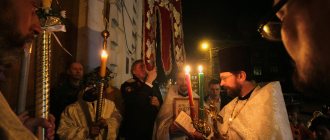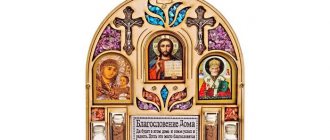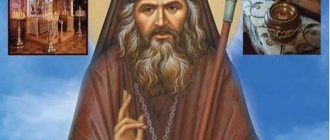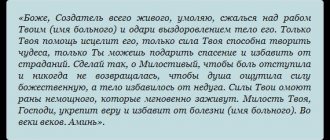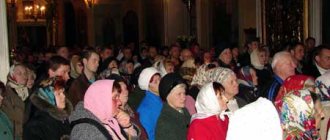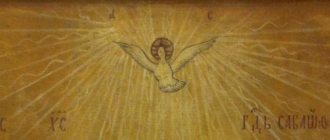Information about the origin of St. Isaac the Syrian
Little is known about the exact details of the life and ascetic activity of St. Isaac the Syrian. Biographical information that has come down to us from early centuries varies in detail.
Knowledge regarding this important pathological issue was for a long time so limited that until the 18th century the Monk Isaac was often identified with different people: sometimes with Isaac, a poet and polemicist of the 5th century, a famous Antioch presbyter; then with Isaac, who was fleeing in Italy (mentioned in the works of St. Gregory the Dvoeslov); sometimes with the Bishop of Nineveh, sometimes with a completely unknown person.
More or less reliable data became available to a wide range of Church historians with the discovery and publication of an Arabic biography of this saint. The author of the named biographical source was content with brief information and did not provide accurate detailed facts about the birth and life of the monk. Nevertheless, this source revealed a number of important data that opened up the possibility of more clearly identifying the identity of Saint Isaac. In 1896, through the efforts of the French researcher Chabot, the work of the Syrian historian of the 8th century, Jezudena, gained fame, in which, among other things, he set out the story of Mar-Isaac.
From a general comparison of the historical monuments available today, the picture of the life of Isaac the Syrian develops as follows. He lived approximately in the VI-VII centuries. According to some sources, he came from Beth-Katarayya, and according to others, his birthplace was the city of Nineveh, an ancient cultural, political and economic center.
Even in his youth, Isaac and his brother entered the monastery of Mar Matthew. Both of them stood out among the inhabitants of the monastery for the height of their exploits and learning. As a result, Isaac's brother was awarded leadership of the monastery. Isaac himself, having chosen the path of prayerful solitude and silence, retired to a hermit’s cell.
Most prudent Abba Isaac the Syrian
Ascetics in all centuries have valued the gift of spiritual reasoning.
Mentors who shone with this gift were especially revered. What is this gift? What historical examples can we use to learn about the gift of spiritual reasoning? For examples, let us turn to the legacy of the Monks Isaac the Syrian and John Climacus. Their topic for spiritual discussion is the most pressing, “classical”: how does a destructive passion take root in the human heart, how does it become a person’s “second nature”? The Monk John Climacus gives an example of spiritual reasoning on this topic from the experience of ascetics of high life. In St. Isaac the Syrian we will find a more common example, painfully familiar to every Orthodox Christian. And that’s why the second example is perhaps more important than the first.
* * *
How does passion become “second nature” to a person? In his Word on Chastity[1], Abba John Climacus lists the “classical” stages of the rooting of a lustful thought in the soul:
1. the pretext of a sinful thought (a thought appears in a person’s field of attention as a seductive word or visual image);
2. combination (a person pays attention to a thought);
3. condolence (a person agrees with the thought and receives pleasure from it);
4. struggle (a person struggles with a sinful thought “on equal terms”);
5. captivity (the thought wins, a person is unable to resist sin);
6. passion (thought takes root in the soul, becomes its “second nature” [2]).
To these well-known stages of the rooting of a lustful thought, Abba John adds another example from the life of “the most enlightened and prudent fathers.” This is where the gift of spiritual reasoning manifests itself - the fathers noticed another way in which prodigal passion attacks experienced ascetics. They called this type of attack a thought attack. What kind of attack?
The onslaught of thought “without words or images instantly presents passion to the ascetic... without combination, without continuation of time, in an inexplicable... image, suddenly appears as its presence in the soul”[3]. Listing the stages of the rooting of a sinful thought, Abba John notes that the stage of struggle may not be present. With a rush of thought, it turns out there is no combination! Of course, there is no conflict or struggle. The onslaught of thought reaches the stage of captivity and passion “without words or images,” that is, without the “classical” pretext of thought. Through repentance, the most prudent fathers were able to expose the insidious attack of thought, “comprehend such subtlety of thought” and, by the grace of God, overcome its harmful consequences.
So, St. John examines the stages of the rooting of a lustful thought in the soul and talks about more subtle invisible warfare. She is led against experienced hesychasts by a foray of thought; it is also a lustful thought, only extremely subtle and fast-acting. Whose gift of spiritual reasoning do we read about from St. John? Which of the fathers showed a high gift and exposed the onslaught of thought? It's impossible to say for sure. But don’t rush to get upset. We will find similar reasoning in Isaac the Syrian, and here the authorship of spiritual reasoning will be obvious.
* * *
“The Sermon on the Order of Subtle Reasoning” by Abba Isaac the Syrian also speaks about the action of passion, about adversity (attack) and adversity. Here is the text of the original source: “Not all passions wage war by attacking thoughts. For there are passions that show only sorrow to the soul. Negligence, despondency, sadness do not attack by attacking thoughts and pleasure (Greek: uk en prosvoli, ude en anesi
), but only put a burden on the soul.
The strength of the soul is tested in victory over passions that wage war by attacking thoughts. And a person must have a subtle understanding (Greek: gnosin leptin
) about all this, so that, with every step taken, he is aware... in which country the soul began to walk”[4].
Abba Isaac touches on the “classical” theme of the struggle against passions and makes a wonderful clarification: the struggle against passions is not the same, it differs depending on what passion is active - fornication or despondency. The spiritual reasoning of St. Isaac is both simple and very valuable.
As we know, usually a lustful thought is attacked (the pretext of the thought), then a combination with the thought follows, addiction (combined with pleasure) and further until captivity and the unhindered action of passion in the soul. The stage of surrender plays a key role in the fight against lustful thoughts, since the pleasure of lustful thoughts attracts a person to sin. Because of pleasure, sin becomes something attractive for a person. Only then does sin reveal its unnaturalness and abomination to the fullest. In addition to pleasure, it brings a person sorrow, disgust, and a feeling of spiritual devastation. And the torment of conscience awakens in a person, which can lead to repentance and forgiveness of sin, to the cleansing of the soul. But that’s all later, and the prodigal warfare begins with battle and coitus-delight.
Dejection acts differently, not through pleasure, but immediately through sorrow. There is no “classical” pretext of thought (seductive word or image). There is no combination or addition. There is another thing: despondency puts a burden on the soul. Perhaps the imposition of a dull heaviness on the soul should be correlated with the stage of struggle and captivity.
Unfortunately, we do not always fight against despondency. Feeling a heaviness in his soul, a person thinks: “It’s kind of a melancholy day for me today. And how could it be otherwise? I'm not feeling well today. And here there are even more reasons for a sad mood. In the morning, the television news announced a rise in prices, half an hour later there was an alarming call from work...” A person has no idea that despondency is pushing him into an arc. He doesn't see the enemy at point-blank range. He believes that this is just his mood. He believes that the manifestation of his melancholic nature was combined with ill health, rising prices and problems at work. The man has no idea that it is hard for him, since the passion of despondency has captivated him. Over time, it becomes “second nature” to a person, and the soul itself looks for reasons for despondency, suffers from despondency and again goes in search of “negativity.” And there are too many reasons for despondency in any news release, a hundred times more than the maximum permissible norm.
Of course, the influx of a sad mood can hardly be called a “classical” attack of thoughts. People do not fall into despondency through the delightful stage of marriage. And this absence of pleasure, the absence of additional attraction helps us fight despondency.
and sadness. That is why, according to Abba Isaac, the strength of the soul “is tested in victory over passions that wage war by fighting thoughts.” We readily admit that the heaviness that has appeared in the soul cannot be called an attack of thought - in the sense of “word and image.” However, the prodigal incursion of thought also acts “without word or image,” however, St. John Climacus calls it a refined thought... In order to usefully reflect on the incursion of thought or the specific effect of despondency, you need to be spiritually sensible.
It’s a miracle how reasonable the Monk Isaac the Syrian is! He traces the most different ways in which sinful thoughts take root in the human soul. Abba Isaac reveals in all his strength the gift of spiritual reasoning.
Ascetic life
His brother repeatedly sent him letters, urging him to return to the monastery. But he, without doubting the correctness of his meaningful choice, continued his hermit life. As justification for this decision, the monk emphasized the need to concentrate on prayer and contemplation of God, and the fight against scattered thoughts and wandering of the mind (cf. Homily 24).
Over time, the fame of the holiness of Isaac's life spread so much that the people of Nineveh began to ask and insist on his consecration as Bishop of Nineveh. The monk did not reject the will of the people and, relying on God’s Providence, accepted the dignity of bishop. They say that Patriarch George ordained him a bishop in the Beth-Abe monastery.
Meanwhile, not all local residents, due to the depravity of their morals, were ready to listen to him as their shepherd. And one incident completely infuriated the monk. A certain creditor could not collect the debt from his debtor in a timely manner and threatened to transfer it into the hands of a judge; and he, in turn, not being able to pay immediately, asked for a deferment. When they brought the problem to the court of Father Isaac, he reminded the lender that, according to the Gospel, even complete forgiveness of debts, and even more so, their deferment, may be appropriate. In response, the disgruntled lender became angry and made it clear that since the Gospel did not meet his current material interests, it was not an absolute authority for him.
So, the disobedience of his flock led to the fact that after approximately five months of governing the diocese, Saint Isaac renounced the post of bishop and retired from the world: according to some sources, to the monastery hermitage in Egypt, and according to others, to Mount Matu, in the area of Beth-Guzaya (region , lying north of the coast of the Persian Gulf), after which, after living there for some time, he moved to the monastery of Rabban Shabur.
During this period, Saint Isaac was engaged in the ascetic practice traditional for monastic ascetics, spending his life in work, prayer, vigils and fasting. There is a legend that he did not touch boiled food at all, ate three loaves of bread a week, supplementing this meager diet with only a small amount of grass.
Living the life of a hermit, the saint paid great attention to reading and studying the Holy Scriptures. At the same time, he was engaged in writing. According to legend, as a result of intense reading, and, of course, due to extreme exhaustion from ascetic deeds, he lost his sight. But even after this he did not stop engaging in literary work: during this period, his speeches were recorded by monastic scribes.
By the providence of God, the saint lived a long life and rested in the Lord in old age. He died in the Shabur monastery.
About Abba Isaac St. Joseph the Hesychast said this: “If all the writings of the holy desert fathers on sobriety and prayer were lost and only the ascetic words of Abba Isaac were preserved, they would be enough to teach a person a life of silence and prayer from beginning to end. These creations reveal the ascetic life from A to Z, and they alone are enough to instruct a person from the first steps and lead him to perfection.”
The creative legacy of St. Isaac, mentor of monks and church writer
We do not know the exact number of works compiled by the monk. But even those that have been discovered today reveal in him a well-educated, spiritually mature ascetic, a very prolific author (see: Ascetic Words).
The range of questions raised by Saint Isaac throughout his literary career is extremely broad. His focus was on numerous exhortations to the monastics; instructions related to the disclosure of dogmatic truths; personal psychological observations; and the experience of encounters with God. So we can say: despite the ascetic nature of his writings, in general they are addressed to a wide range of people.
A characteristic feature of the work of St. Isaac as a spiritual writer is a clear connection between doctrinal edifications and their practical application to life.
Thus, when discussing God, he does not forget to indicate what is the benefit of constant contemplation of God (see: Homily 8.), and draws moral parallels between Divine properties and Christian virtues. Talking about angels, he reveals their role in the formation and spiritual and moral improvement of the individual, and talking about demons, he reveals the means they use in the framework of invisible warfare, clarifies what their cunning and cunning consist of (see: Word 60.).
The saint set the acquisition of dispassion as one of the most important tasks in achieving the highest perfection. True dispassion, he emphasized, does not consist in not feeling the movement of passions within oneself, but in making them alien to a Christian, in not accepting them under any circumstances.
The saint paid special attention to the fact that one cannot treat without due attention even those types of sins that are considered minor among sinners. Such a person will inevitably fall into more serious sins and receive more terrible punishment (see: Word 57.).
Essays
According to the testimony of Ebed-Iezu, a Syrian writer of the 13th century, St. Isaac left seven volumes of teachings, of which only 133 teachings have been preserved in Arabic translation, under the title “Monastic Rule”, and a letter to Simeon the Divnogorets [4]. 99 teachings are known in the Syriac original and in the Greek translation. The publication of his works is Minya, “Patrologiae cursus, ser. graeca" (vol. LXXXVI). Russian translation - in “Works of St. Fathers" (ed. Moscow Spiritual Academy, 1854) The content of all his teachings is an analysis of various states of righteousness and sinfulness and methods of Christian correction and self-improvement.
